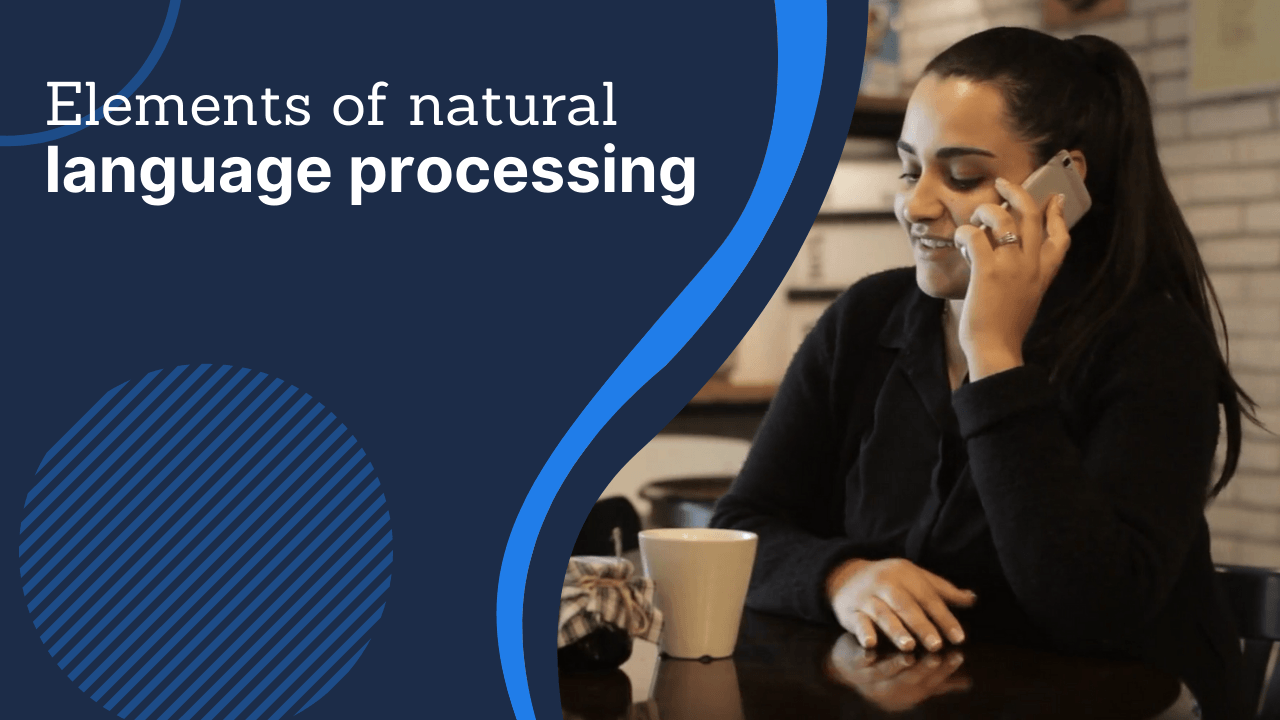-
 Published: Jun 21, 2023
Published: Jun 21, 2023
-
 12 min. read
12 min. read
-
 Sina Mchunu
Sina Mchunu Research & Tech Content Writer
Research & Tech Content Writer
- Sina is a marketing expert who specializes in SEO, AI, and digital marketing content. With over five years of experience, she’s written hundreds of pieces, spanning a variety of topics and industry niches. She loves combining her strong eye for detail and passion for storytelling in her work. You’ll find her fruit picking or horse riding at the local farm when she’s not writing.
Natural language processing (NLP) is a branch of artificial intelligence (AI) that analyzes the interaction of humans and computers via natural language. It requires developing algorithms and computational models to process and reproduce human speech.
The growth of digital data and the necessity for robots to understand it have made NLP more and more relevant in recent years. It is utilized in various applications, including sentiment analysis in social media and virtual assistants like Siri and Alexa.
It’s also essential to systems for text-to-speech, voice recognition, and language translation. With the ongoing development of NLP, we can anticipate more significant improvements ways computers communicate with people in the future.
Here is everything you should know about NLP:
Don’t miss our Marketing Manager Insider emails!
Join 200K smart marketers for the hottest marketing news and insights in your inbox.
Inline Subscription Form
“*” indicates required fields


What is natural language processing?
Natural language processing is a discipline of AI that studies the interaction of computers and humans via natural language. It entails programming computers to comprehend, interpret, and produce human speech.
How does NLP work?
Using various methods and algorithms, NLP analyzes and derives meaning from language. Another essential element is creating natural language, which entails composing coherent, meaningful, and grammatically sound phrases.
The development of natural language, which involves stringing together grammatically correct, meaningful, and coherent phrases, is another crucial component. NLP also extensively uses machine learning and AI to increase precision and efficacy.
After training, these models can produce new languages and make predictions. In sum, NLP is an intricate and ever-evolving discipline with the potential to alter how we communicate with machines and one another radically.
We’re masters of our craft.


300+

9,000+

4,000+

200+

100+
NLP techniques and methods
Using various tools and methodologies, NLP decodes, interprets, and produces human language. These techniques include:
- Machine learning algorithms
- Deep learning models
- Statistical analysis methods
- Semantic analysis tools
- Rule-based systems
1. Machine learning algorithms
One of the methods for NLP frequently utilized is machine learning. These algorithms can detect patterns and connections between words and sentences after being trained on vast databases of linguistic data.
NLP frequently employs a variety of machine learning techniques, such as:
- Decision trees
- Support vector machines
- Neural networks
You can apply these algorithms to various applications, including named entity identification, text categorization, and sentiment analysis.
The ability to train machine learning algorithms on specific areas or subjects enables them to perform more correctly in specialized jobs. Machine learning algorithms are helpful for NPL because they can improve over time as you expose them to more data.
However, the efficacy might vary widely depending on factors like the training data’s quality and the algorithm’s design. So, getting accurate and meaningful NLP results requires picking the suitable machine learning algorithm and ensuring it’s adequately trained.
2. Deep learning models
Deep learning models like convolutional and recurrent neural networks show great potential for NPL tasks. These models can understand intricate data patterns and perform at the highest level on tasks like language modeling and machine translation.
Deep learning models benefit from automatically learning features from unprocessed data, doing away with human feature engineering requirements. Nevertheless, these models frequently need data and computer power to train well.
Despite their potential, it is crucial to carefully assess the performance of deep learning models and consider the trade-offs between their complexity and computational requirements and the accuracy and usefulness of their results for a specific NLP task.
In addition, it’s critical to think about the interpretability of deep learning models since, compared to conventional machine learning models, they might be challenging to comprehend and explain. Deep learning models, however, may be a potent tool for obtaining precise and efficient NLP outputs if given the correct data and resources.
3. Statistical analysis methods
NLP has also made extensive use of statistical analytic techniques. These approaches rely on statistical models and algorithms that can find trends and connections in data. You can apply them to projects like:
- text classification
- sentiment analysis
- information extraction
In contrast to deep learning models, statistical analysis techniques sometimes call for human feature engineering, which may be time-consuming and may only partially capture some of the pertinent information in the data. However, even with modest data, these techniques can still be helpful and easier to understand.
Considering the advantages and disadvantages of deep learning models and statistical analysis techniques is crucial when selecting a strategy for a specific natural language processing task.
The bag-of-words model is a popular statistical analysis technique used in NLP. This approach ignores grammar and word order and portrays text as a collection of isolated words.
Each word in the text is assigned a numeric value according to how often it appears, and this frequency data construct a vector representation of the text.
This vector can apply to tasks like text categorization or clustering. The Markov model is a different statistical technique that uses probability to predict the chances that a specific phrase or string of words will appear in a text. These models apply to tasks like speech recognition and language modeling.
4. Semantic analysis tools
Semantic analysis tools comprehend the meaning of words and how they relate to other words in a phrase. NLP commonly utilizes:
- Sentiment analysis to determine the emotion behind a text or speech.
- Text classification to categorize a text into predefined categories.
- Machine translation to interpret text from one language to another.
- Named entity recognition to identify named entities such as names of people, organizations, and locations in a text.
- Speech recognition to convert spoken words into text.
These techniques and methods are widely used in various industries. Businesses, for example, employ sentiment analysis to examine consumer comments and determine their degree of happiness. News organizations use text classification to categorize stories into several subjects.
Law enforcement agencies use named entity recognition to locate and identify criminals. Virtual assistants like Siri and Alexa use speech recognition to interpret and respond to human requests.
The applications of NLP and semantic analysis tools are numerous and diverse, and they continue to expand as technology advances.
5. Rule-based systems
Another popular NLP method is rule-based systems — which analyze and process text using predetermined rules. These rules are typically straightforward or intricate, and you can tailor them to meet the unique requirements of a given task or sector of the economy.
Rule-based systems are often used in areas such as:
- Information retrieval
- Question answering
- Text summarization
They might not be as advanced as other NLP methods, but they are still an excellent approach to swiftly and accurately analyze enormous volumes of text. We anticipate seeing many more cutting-edge applications and methodologies emerge as NLP technology develops.
Measuring the metrics that affect your bottom line.
Are you interested in custom reporting that is specific to your unique business needs? Powered by RevenueCloudFX, WebFX creates custom reports based on the metrics that matter most to your company.
- Leads
- Transactions
- Calls
- Revenue

NPL use cases across industries
NLP has emerged as a critical component for companies in various sectors. Organizations use NLP technology to gather information, automate office procedures, and improve user experiences.
Here are some of the most useful NLP technology uses in various fields:
- Customer behavior analysis and content personalization in marketing
- Chatbots and language translation in customer service
- Clinical documentation and medical coding in health care
- Sentiment analysis and fraud detection in finance
- Contract analysis and e-discovery in legal cases
- Quality control and predictive maintenance in manufacturing
1. Customer behavior analysis and content personalization in marketing
Marketers use NLP to study consumer behavior by looking at information gleaned from customer interactions, like:
- social media posts
- customer reviews
- customer service conversations
Your company can use NLP to gather information about its target market’s preferences, needs, and pain points. You can then use this information to personalize content and marketing messages to appeal to particular customers more effectively.
Amazon is one business that uses NLP to analyze consumer behavior and personalize marketing material. The corporation uses NLP technology to evaluate consumer interactions across social media, customer reviews, and customer care chats to gather insightful knowledge about client preferences. Their team then utilizes this data to tailor suggestions and messages to each customer’s needs.
You can also use NLP to assess consumer sentiment about a particular brand or item. Your team can use this data to pinpoint improvement areas or develop customized marketing efforts that respond to specific issues or grievances.
2. Chatbots and language translation in customer service
NLP is crucial to developing customer support chatbots and language translation software. Chatbots employ NLP algorithms to comprehend and analyze user input and deliver pertinent and helpful replies.
In addition, language translation tools leverage NLP to provide precise renditions of customer inquiries and responses in target languages, facilitating two-way communication between businesses and their target audiences.
For instance, Zendesk employs NLP for chatbots and language translation in customer support. Their technology offers automated chat support utilizing NLP algorithms that comprehend and interpret user inquiries, providing clients with practical and fast answers.
Moreover, they provide multilingual support with real-time, accurate language translation technologies, which use NLP to translate client discussions into several languages.
Applying NLP to customer service has resulted in a marked uptick in efficiency and comfort for service recipients.
3. Clinical documentation and medical coding in health care
Correct medical coding and clinical documentation are prerequisites for efficient record-keeping and financial compensation in the health care industry. The practice entails recording information on patient visits, diagnoses, and treatments in a consistent manner that can be read and understood by other medical staff.
Medical coders then use NPL to utilize this information to assign codes to diagnoses and treatments for use in patient billing and insurance reimbursement. Correct and thorough clinical documentation and coding are essential for medical practices to get paid for their work and for patients to receive the best possible treatment.
The American Health Information Management Association (AHIMA) is one group that applies NPL to clinical documentation and medical coding. The organization offers training and advocacy for health information professionals responsible for maintaining the accuracy, confidentiality, and accessibility of patient records.
Moreover, they advocate using standardized nomenclature and coding schemes like NPL to enhance patient care and communication.
Additionally, by ensuring that all health care practitioners are using the same language to describe medical illnesses and treatments, standardized terminology and coding systems serve to eliminate mistakes and increase patient safety. Accurate recording and coding can also offer helpful information for research and projects aimed at raising the standard of health care.
4. Sentiment analysis and fraud detection in finance
Sentiment analysis uses NLP to determine how people feel about a brand, company, or topic, which is helpful in the financial sector. You can employ this data to guide your marketing and investment decisions.
NLP can identify fraudulent activity by examining communication and transaction patterns for discrepancies. NLP algorithms can detect suspicious transactions by spotting anomalous language or behavior, prompting banks to investigate further.
Since introducing this technology, financial institutions have avoided losing millions of dollars due to fraudulent operations.
Ayasdi is one example of a business using NLP for sentiment analysis and fraud prevention in banking. The Ayasdi platform uses machine learning and NLP algorithms to sift through mountains of financial data searching for abnormalities and trends that might signal fraud.
Financial powerhouses like Citigroup and HSBC have invested in this tech to bolster fraud detection and decision-making processes. The use of NLP in the financial sector has the potential to enhance risk management and reduce fraudulent activities.
5. Contract analysis and e-discovery in legal cases
The legal profession finds NLP valuable for streamlining processes and increasing productivity. This technology has applications in the legal profession, such as contract analysis and electronic discovery. Most law firms use NLP to analyze contracts to:
- Find relevant phrases and clauses
- Indicate any contradictions or problems
- Recommend alternative wording for particular elements
NLP is helpful in e-discovery because it can aid in reviewing large amounts of electronic documents by locating critical pieces of information and cutting down on the time and effort required for manual review.
Kira Systems is one firm that employs NLP for contract analysis and e-discovery. Their program uses NLP to quickly and accurately detect essential phrases, conditions, and possible problems in legal documents like contracts. This technology can also aid with e-discovery — it can help lawyers swiftly filter through vast amounts of digital data to find the needed evidence.
Moreover, NLP can assist with document classification and arrangement, making it more straightforward for legal teams to search for and discover certain information. Also, by spotting patterns and trends in massive data sets, this technology can offer crucial information for planning and making decisions in the legal field.
6. Quality control and predictive maintenance in manufacturing
The manufacturing industry uses NLP to glean information from unstructured sources, including maintenance records, customer comments, and social media posts. With NLP, you can analyze this data to foresee when equipment failures may occur and schedule maintenance.
You can also utilize NLP to improve quality control by evaluating client complaints and finding frequent issues, allowing you to make the required changes and improvements. Moreover, NLP can aid in automating quality control operations by detecting flaws in real-time, minimizing the need for manual inspection.
IBM employs NLP in manufacturing to improve quality control and predictive maintenance. They use NLP technology to analyze vast volumes of unstructured data from many sources to find trends and abnormalities in equipment performance, forecast maintenance needs, and automate quality control operations.
Their NLP technology also assists manufacturers in understanding client complaints and comments, helping them to enhance their goods and services.
WebFX helps companies like yours reach their business goals.
See Case StudyWant to learn more about NLP?
If you’re still curious about NLP and how it relates to SEO, give our SEO specialists at WebFX a call at 888-601-5359, or contact us online! We’ve been in business for over a decade. We’re experts at our craft regarding advanced SEO techniques and how they relate to NLP. We can’t wait to hear from you and fill you in on our long list of web marketing services!
-
 Sina is a marketing expert who specializes in SEO, AI, and digital marketing content. With over five years of experience, she’s written hundreds of pieces, spanning a variety of topics and industry niches. She loves combining her strong eye for detail and passion for storytelling in her work. You’ll find her fruit picking or horse riding at the local farm when she’s not writing.
Sina is a marketing expert who specializes in SEO, AI, and digital marketing content. With over five years of experience, she’s written hundreds of pieces, spanning a variety of topics and industry niches. She loves combining her strong eye for detail and passion for storytelling in her work. You’ll find her fruit picking or horse riding at the local farm when she’s not writing. -

WebFX is a full-service marketing agency with 1,100+ client reviews and a 4.9-star rating on Clutch! Find out how our expert team and revenue-accelerating tech can drive results for you! Learn more
Try our free Marketing Calculator
Craft a tailored online marketing strategy! Utilize our free Internet marketing calculator for a custom plan based on your location, reach, timeframe, and budget.
Plan Your Marketing Budget
Table of Contents
- What is natural language processing?
- How does NLP work?
- NLP techniques and methods
- 1. Machine learning algorithms
- 2. Deep learning models
- 3. Statistical analysis methods
- 4. Semantic analysis tools
- 5. Rule-based systems
- NPL use cases across industries
- 1. Customer behavior analysis and content personalization in marketing
- 2. Chatbots and language translation in customer service
- 3. Clinical documentation and medical coding in health care
- 4. Sentiment analysis and fraud detection in finance
- 5. Contract analysis and e-discovery in legal cases
- 6. Quality control and predictive maintenance in manufacturing
- Want to learn more about NLP?

SEO Success with KOA

Proven Marketing Strategies
Try our free Marketing Calculator
Craft a tailored online marketing strategy! Utilize our free Internet marketing calculator for a custom plan based on your location, reach, timeframe, and budget.
Plan Your Marketing Budget
What to read next






